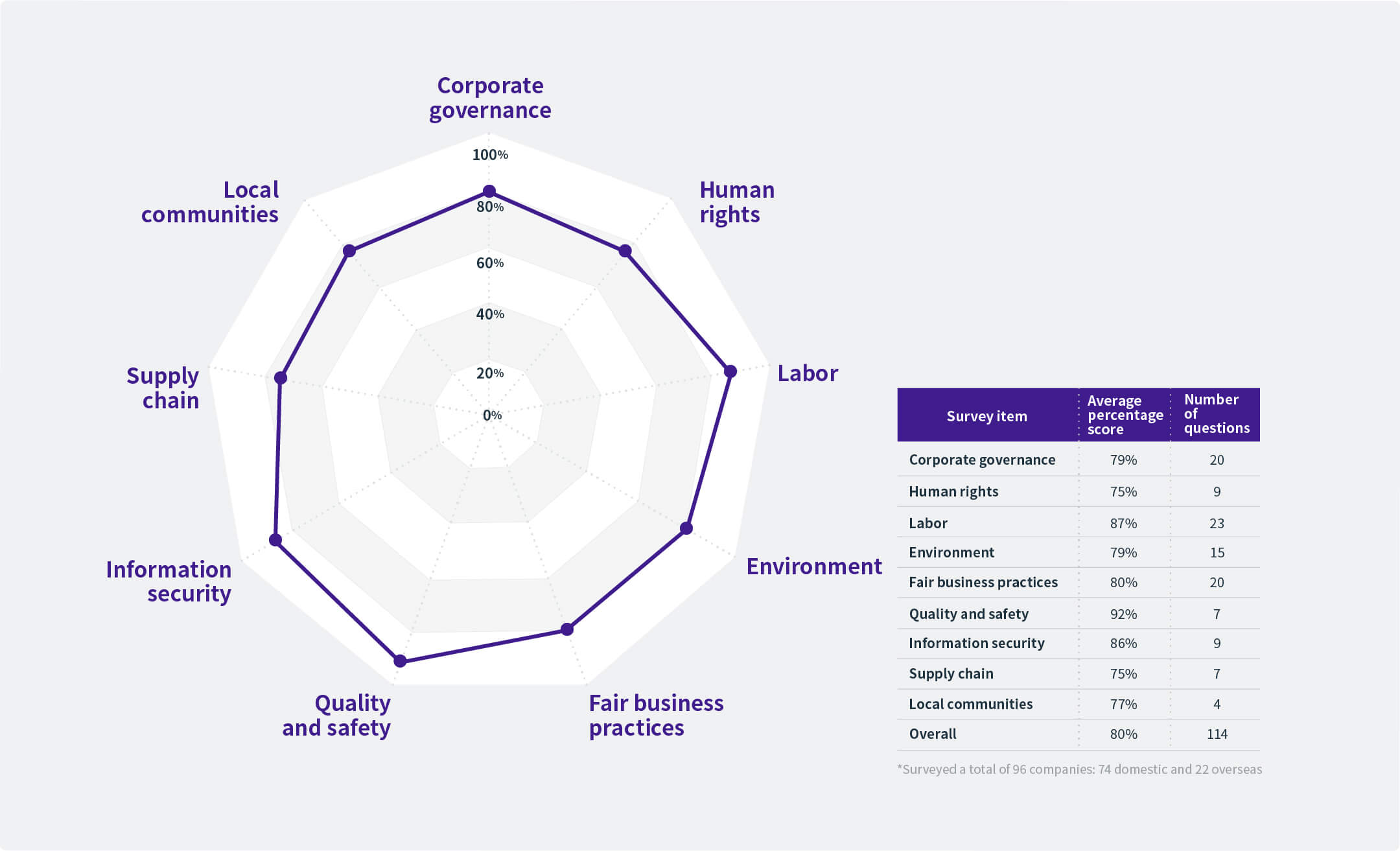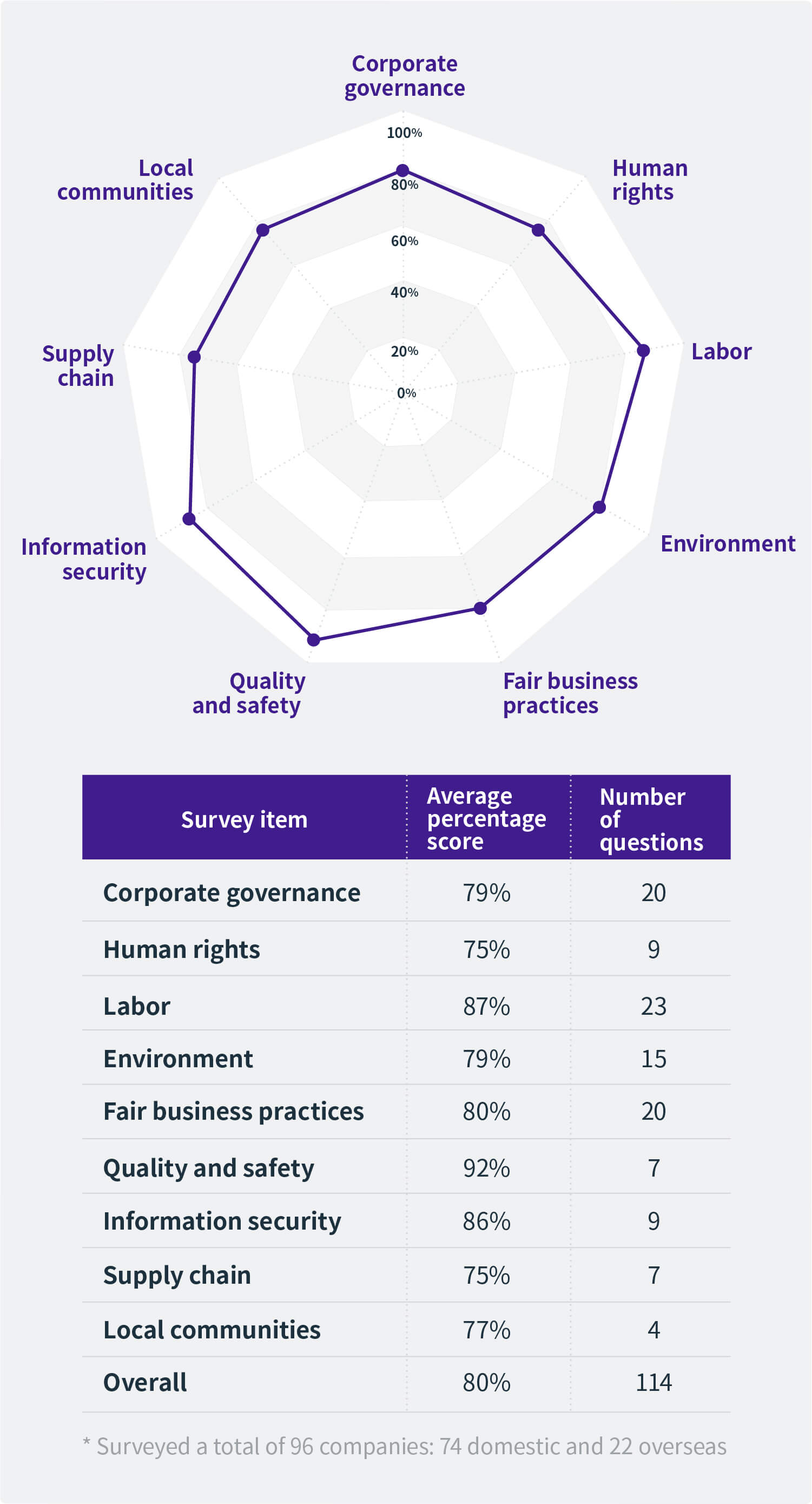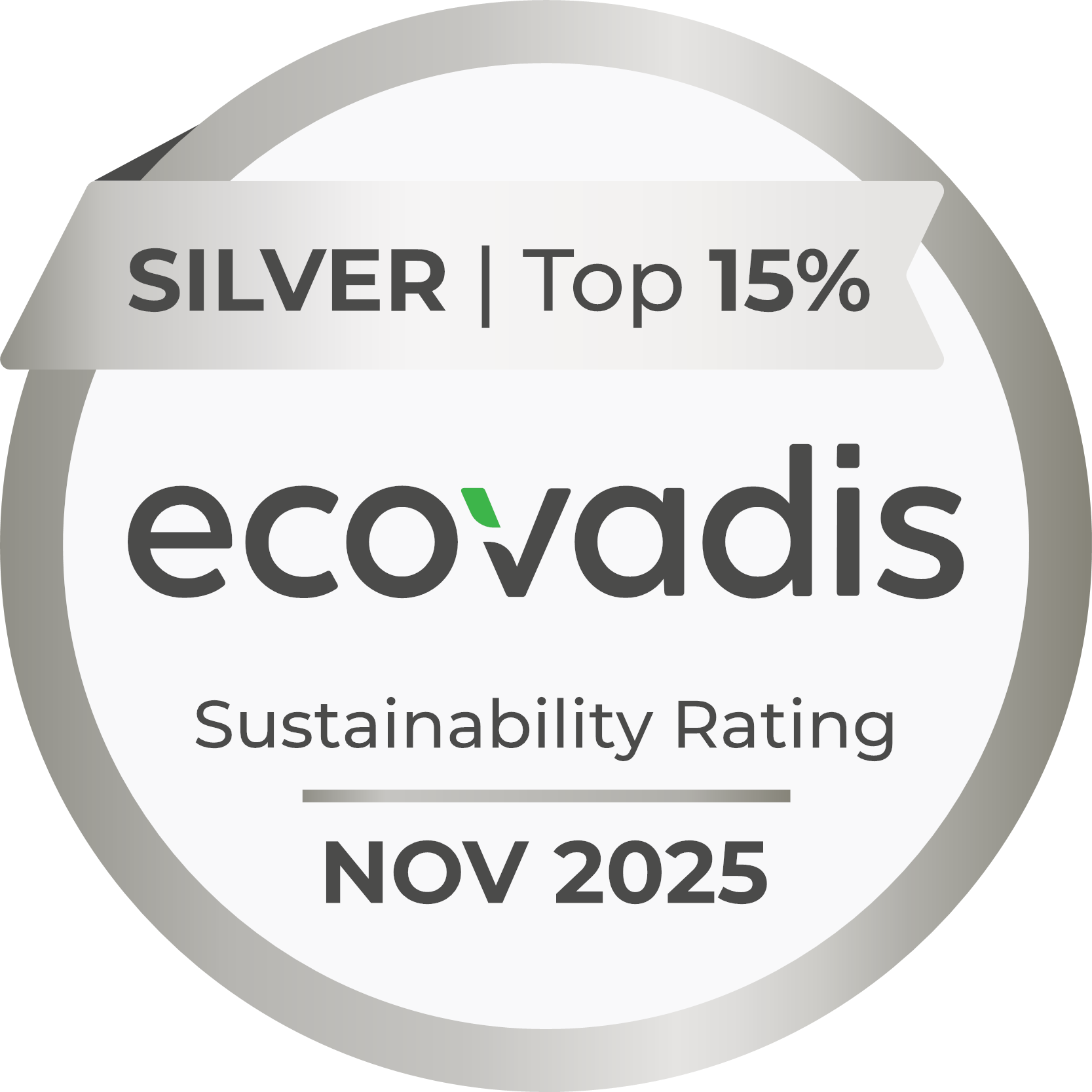Supply Chain Management
Approach to Supply Chain Management
Based on our own basic sustainability policy, the Milbon Group conducts business activities to create a sustainable beauty industry and realize a sustainable society. In promoting our business, one of the most important tasks is ensuring a sustainable supply chain that we build together with our suppliers. We will achieve this through fair and equitable purchasing and procurement activities in compliance with laws and regulations, and by giving due consideration to the protection of natural resources, environmental conservation and human rights.
Milbon Sustainable Procurement Basic Policy
Basic Policy
- Realization of fair and equitable transactions
With respect to purchasing transactions, we provide all suppliers, both domestic and overseas, with opportunities for fair competition. i We also determine our suppliers fairly, by comprehensively considering such factors as quality, price, delivery dates, management stability, and supply capacity. - Compliance with laws, regulations, and social norms
With respect to purchasing transactions, we will strive to fulfill our social responsibilities by ensuring compliance with relevant laws and regulations, conducting transactions in accordance with social norms, and giving due consideration to the protection of natural resources, environmental conservation, and human rights.
We will also keep hospitality and gift-giving to and from our business partners within the bounds of what is socially acceptable and in accordance with the Milbon Ethical Conduct Guidelines. - Mutual development
Through our procurement activities, we strive for coexistence and co-prosperity with our suppliers, building long-term relationships of trust and mutual development. - Protection of information
We will maintain the confidentiality of classified information and personal information of our suppliers obtained through purchasing transactions.
Requests to suppliers involved in our procurement activities
To ensure a sustainable supply chain, we share the following requests with our partner suppliers.
We ask that our suppliers understand the objective of these requests and to be more proactive in their efforts to ensure a sustainable supply chain.
Requests to our suppliers
< Considerations for social responsibility >
- Compliance with laws, regulations, and social norms
- Consideration for human rights and labor rights
- Respect for fundamental human rights and prohibition of discrimination
- Prohibition of child labor
- Prohibition of forced labor
- Establishment of a healthy and safe work environments
- Elimination of excessive overtime work
- Respect and support for the right to a minimum wage and living wage
- Respect and support for the right to freedom of association and collective bargaining
- Fair and equitable activities
- Prevention of corruption
- Compliance with laws and regulations concerning commercial transactions
- Elimination of relationships with antisocial forces
- Appropriate relationships with politics and public officials
- Strict management of confidential information, including personal information
< Considerations for environmental initiatives >
- Response to climate change issues, including CO2 and GHG emissions
- Efficient use of energy and resources
- Conservation of biodiversity
- Water conservation activities, including management of water consumption
- Initiatives for environmental issues and prevention of pollution
- Reduction of waste and promotion of recycling
Every year, we ask suppliers to complete a survey on their efforts with respect to the above requests, and we ask that they strengthen their efforts where necessary.
In addition, we ourselves will actively disclose detailed information on our own efforts related to our basic policy, and aim to ensure a sustainable supply chain through mutual development and collaboration with our suppliers.
Status of Specific Actions
(1) Assessment survey of suppliers
To promote activities based on the Milbon Sustainable Procurement Policy, we conduct an assessment survey of our suppliers once a year.
The purpose of the survey is to understand our suppliers’ sustainability efforts and to recognize any issues in our supply chain.
We will share a summary of the survey results with our suppliers, and together we will consider and promote initiatives for improvement.
< Overview of FY2024 survey >
- Survey target
- Suppliers of raw materials and other materials to Milbon Co., Ltd. and suppliers of raw materials and other materials to Milbon (Thailand)
- Number of target suppliers
- 195 companies in total: domestic suppliers of raw materials, domestic suppliers of other materials, Thai suppliers of raw materials, Thai suppliers of other materials (Covering 95% of all our suppliers, based on purchase amounts.85% response rate)
- Survey period
- October–December 2024
- Survey items
- The survey is conducted by asking suppliers to complete the self-assessment questionnaire (hereafter referred to as GCNJ SAQ) created by the United Nations Global Compact Network Japan (GCNJ) or by asking EcoVadis member companies to share their scorecard results with us.
GCNJ SAQ Overview and Survey Results
Overview of the GCNJ SAQ
Theme |
Topic |
|---|---|
| 1.Corporate governance related to CSR |
|
| 2.Human rights |
|
| 3.Labor |
|
| 4.Environment |
|
| 5.Fair business practices |
|
| 6.Quality and safety |
|
| 7.Information security |
|
| 8.Supply chain |
|
9.Coexistence with local communities |
|
Summary of results
The overall average score was 85% with improvements observed in all survey items compared to the previous year. The item with the highest score remains "quality and safety," while scores for "human rights" and "supply chain" remained relatively low. On the whole, the scores are strong, but there are certain areas where scores remain modest, and some suppliers have flagged specific challenges. In these cases, we plan to leverage the survey feedback, offer support,and engage in conversations to continue building a more sustainable supply chain.


Overview of EcoVadis and summary of scorecard results
Overview of EcoVadis
The EcoVadis survey evaluates corporate sustainability efforts through 21 CSR analysis criteria categorized into four themes: environment, labor & human rights, ethics, and sustainable procurement. The aim of the survey is to promote sustainability in supply chains worldwide. To date, more than 100,000 companies in 200 industries across 175 countries and regions have been surveyed.
Companies registered with EcoVadis are provided a unique questionnaire with about 50 questions based on their size, industry, and country of operation. Once the questionnaire responses and certification documents have been submitted, an analyst analyses and evaluates the information. Scorecards show the evaluation results for four themes: environment, labor & human rights, ethics, and sustainable procurement, as well as an overall score. Scorecards can be shared with other companies.
Summary of results
|
Overall |
Environment |
Labor & human rights |
Ethics |
Sustainable procurement |
|---|---|---|---|---|---|
Average percentage score (FY2023) |
59.6 |
66.5 |
60.3 |
54.5 |
53.9 |
Average percentage score (FY2024) |
63.0 |
67.8 |
62.3 |
58.5 |
57.0 |
The overall average score was 63.0, which is higher than the mode of 45–54 listed in the annual report published by EcoVadis. The score for “environment” was highest, while the score for “sustainable procurement” was relatively low. As with the GCNJ SAQ, we would like to provide feedback on the results of the survey, support activities, engage in discussion, and utilize results to build a more sustainable supply chain.
Source: EcoVadis Business Sustainability Risk and Performance Index 2021
(2) Adoption of RSPO certified palm oil
We are committed to the sustainable procurement of palm oil, one of the main raw materials used in our products.
Given that palm oil is in high demand worldwide and is a key raw material used in our products, we joined the RSPO1 in 2019 to ensure the sustainable use of palm oil. We are currently working to switch some of our raw materials to certified palm oil. By 2030, we aim to use RSPO MB or BC certified2 materials for all palm oil used as a key raw material in our products.
In 2022, we acquired supply chain certification3 for the Yumegaoka Factory, our core production facility.
We have set the above initiatives as the five most important sustainability challenges in our company, and we have set medium- to long-term goals and are promoting these initiatives.
For more information on specific goals and progress, please refer to https://www.milbon.com/en/sustainability/humanrights/action01.html
The Roundtable on Sustainable Palm Oil (RSPO) is an international certification system for the production and use of sustainable palm oil.
Mass Balance (MB) Certification and Book & Claim (BC) Certification are two standards certified by the RSPO. MB is a certification model in which certified oil from certified farms is mixed with other non-certified oil during the distribution process. Although the product physically contains non-certified oil, the certified farms from which palm oil is purchased and their quantities are guaranteed. BC issues certification credits for certified oil produced by RSPO-certified producers. This system supports certified palm oil producers by purchasing their certification credits.
The Supply Chain Certification System (SCCS) is a system that certifies that products made with certified palm oil meet SCCS certification requirements in the manufacturing, processing, and distribution processes.
External Evaluation

Our core production facility, the Yumegaoka Factory (Iga-shi, Mie, Japan), has received a Silver rating in the 2025 assessment of corporate sustainability activities conducted by international rating agency EcoVadis.
EcoVadis ratings evaluate a
company’s sustainability efforts according to 21 CSR criteria across four themes—Environment, Labor & Human Rights, Ethics, and Sustainable Procurement—for the purpose of promoting sustainability within global supply chains. More than 100,000 companies spanning
200 industries in 175 countries and regions have been assessed to date.
We will continue to work with our suppliers to build a sustainable supply chain.



